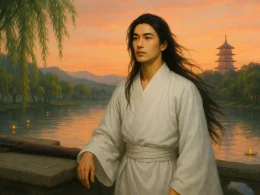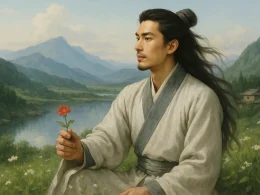Li Qi (c. 690 - 753 AD) . A renowned Tang dynasty poet, Li Qi traced his ancestral roots to Zhao Commandery (present-day Zhao County, Hebei) but resided primarily in Yingyang (modern Dengfeng, Henan). He passed the imperial examination in 735 AD during Emperor Xuanzong's reign and served as a minor official in Xinxiang County. However, frustrated by his stagnant career, he resigned to pursue a reclusive life, devoting himself to poetry and Daoist practices. Li Qi excelled in five- and seven-character verse forms, particularly frontier poems and musical poetry. He maintained close friendships with literary giants like Wang Wei, Gao Shi, and Wang Changling, later being grouped with them as one of the "Four Masters of High Tang" (Gao, Cen, Wang, and Li).
Major Works
Life and Career
1. Early Life and Official Career
Born around 690 AD during Empress Wu's reign, Li Qi came from a wealthy family in Yingyang. In his youth, he associated with pleasure-seeking nobles and squandered his family fortune before repenting and dedicating himself to studies at fifteen. As recorded in his poem "Slow Song," he secluded himself by the Ying River to master classics: "A man must strengthen his resolve; at fifteen I shut my door by Ying's sunny shore."
After a decade of intensive study, he passed the imperial examination in 735 AD at the relatively advanced age of forty-something. Despite this achievement, he only secured a low-ranking post as Xinxiang County尉 (a security official), marking the modest beginning of his bureaucratic career.
2. Career Frustration and Reclusion
Disillusioned by the petty constraints of officialdom and lacking prospects for advancement, Li Qi abandoned his post and retreated to his Yingyang estate. He divided his time between reclusion in the Songshan and Shaoshi Mountains and literary gatherings in Chang'an and Luoyang.
His circle included the era's greatest poets. Wang Wei dedicated a poem to him, noting his Daoist pursuits: "I hear you ingest cinnabar—it lends you radiant health." This reflects Li Qi's indifference to fame and yearning for spiritual freedom.
3. Later Years and Death
In retirement, Li Qi focused on poetry and Daoist alchemy, experimenting with elixirs in vain attempts at immortality. Though never politically influential, his literary reputation flourished. He died around 753 AD at sixty-three, leaving behind a legacy as one of High Tang's most distinctive frontier poets.
Literary Achievements
Li Qi's poetry combines vigorous grandeur with lyrical subtlety, particularly excelling in frontier and musical verse. Alongside Wang Changling, Gao Shi, and Cen Shen, he epitomized High Tang's poetic golden age.
1. Frontier Poetry: Heroic and Desolate
Though few in number, Li Qi's frontier poems are masterpieces of tragic grandeur. Works like "Ancient Marching Song," "Ancient Sentiments," and "Frontier Songs" depict soldiers' hardships and homesickness amid stark landscapes.
《古从军行》
白日登山望烽火,黄昏饮马傍交河。
行人刁斗风沙暗,公主琵琶幽怨多。
野云万里无城郭,雨雪纷纷连大漠。
胡雁哀鸣夜夜飞,胡儿眼泪双双落。
Vivid imagery ("beacon fires," "sandstorms," "wailing geese") creates a chilling battlefield atmosphere, while the Tartars' tears universalize war's tragedy.
2. Musical Poetry: Harmonizing Sound and Emotion
Deeply attuned to music, Li Qi crafted verses that emulate instrumental rhythms. His "Listening to Dong Play the Tartar Reed Pipe" and "Listening to An Wanshan Play the Bili" are quintessential examples.
《听董大弹胡笳声》
板筑声声催晓箭,吹角当楼惊暮寒。
胡雁咽霜飞不起,湘妃泣竹满秋山。
风飘飘兮吹我衣,露濛濛兮湿我履。
Here, onomatopoeia and metaphor translate reed-pipe melodies into visceral emotion, evoking both music and homesickness.
3. Other Works: Lyric and Historical Themes
Beyond his signature genres, Li Qi composed autobiographical poems like "Slow Song" (reflecting on his unfulfilled ambitions) and farewell verses such as "Seeing Off Wei Wan to the Capital."
Stylistic Features
- Vigorous yet poignant language: His frontier poems balance masculine heroism with tender melancholy, using stark nature imagery to amplify emotional depth.
- Precise rhythmic structures: Musical poems employ parallel couplets and tonal patterns that mirror instrumental phrasing.
- Synesthetic blending: By fusing sound, imagery, and feeling, he makes readers "hear" pipas and war drums through verse.
Legacy
Ranked alongside Wang Changling and Gao Shi, Li Qi pioneered frontier poetry's emotional complexity while elevating musical verse to new artistic heights. Though unsuccessful as an official, he achieved poetic immortality—a testament to High Tang's cultural brilliance. His works remain essential for understanding Tang literature's golden age.


















